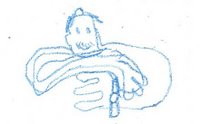Reflejos ::: Reflections
Debió inventarse la ventana para la luz; para el aire también, el de la noche y el de las noches de luna, hechas de aire y luz, mejor que el mejor día. Pero el aire y sus ramalazos de granizo y nieve, debió engendrar el prolongado invento--la imaginación--del vidrio, transparenca que detiene el aire sin detener la luz, lo sobre todo deseable. Luz de lo de afuera, mundana luz que muestra y luz para mirar en lo interior, disuelta luz en el pesado estarse del aire quieto en que se habita. Adentro y afuera. Uno y otro. El vidrio, la ventana, delimita y contrapone. Pero también confunde, cuando el aquí del que mira y el allá mirado comparten y entrelazan en la transparencia y el reflejo sus dos mundos: la imagen irreal, incorpórea de una tercera dimensión, fascinación del ojo y del cerebro que--sorprendido--interpreta lo mirado.
Windows must have been invent for the light; for the air too, the night air and the air of the moonlit nights, nights made of air and light, nights better than the best of days. But air and its bursts of hail and snow, must have generated the prolonged invention--the imagination--of the glass, the transparence that stops the air without stopping light, the most desired. Light of the outside, a worldly light, and light to look within, light dissolved in the heavy still air of the place of living. The Inside and the outside. One and the other. The glass, the window, delimits and differentiates. But it also confuses, when the here of the onlooker and the observed there share and intertwine, in the transparent and the reflection, their two worlds: the unreal image, the disembodied image of a third dimension, the eye’s fascination that the brain--surprised by it--interprets.






